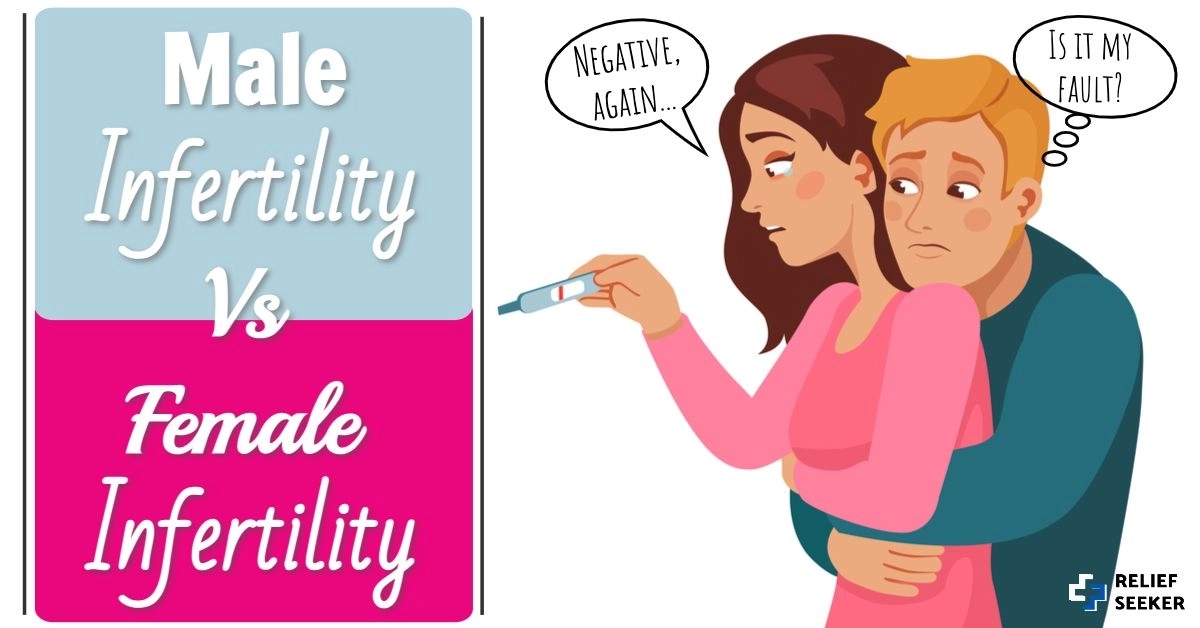In 2010, an estimated 48.5 million couples worldwide were infertile. When it comes to fertility problems, women are usually to blame. Yet, many couples facing fertility issues don’t take into account the malefactor.
Both men and women have an equal chance of experiencing reproductive system issues. When it comes to male infertility vs. female infertility, it’s no one’s ‘fault’ per se. Yet, men and women play an equal role in fertility rates, and both sexes experience similar issues.
Discover the risk factors involved in infertility and how to treat male infertility if it’s already an issue.
What Is Infertility Exactly?
Infertility is diagnosed when a couple cannot achieve a pregnancy after one year of sexual intercourse. For women, infertility is often diagnosed after two or more failed pregnancies.
The National Institute of Child and Human Development states, “In couples younger than age 30 who are generally healthy, 20% to 37% can conceive in the first 3 months.”
“Overall, one-third of infertility cases are caused by male reproductive issues, one-third by female reproductive issues, and one-third by both male and female reproductive issues or by unknown factors.”
History of Female Infertility
Historically speaking, infertility isn’t new (though we often perceive it as a 21st-century problem).
Cultures all the way back to the ancient Egyptians dealt with infertility issues.
Many documented cases were related to high-status families (such as royalty). We all know the stories of some of the most high-profile infertility cases, such as the ill-fated Anne Boleyn, wife of King Henry VIII (which caused not only the condemnation of ‘infertile’ women but also the separation of the English crown from the Catholic church).
We all know that a mighty (and slightly deranged) king could never have been to blame for infertility issues. (No matter that King Henry VIII was said to have weighed up to 400 pounds in his lifetime and suffered from both diabetes and gout.)
But because women carry babies, they were often blamed for infertility — without any proof.
Modern-Day Infertility
The first test-tube baby was born on July 25, 1978, and this is where things start getting interesting. From the women’s lib movement forward, society starts to see childlessness as a modern-day issue, seemingly worsening by the hour.
While some of this is true (sperm counts have dipped 50% in 50 years), it’s safe to say that infertility has always been a problem — we just weren’t documenting male infertility as much until recently.
Male Infertility Vs Female Infertility
When it comes to infertility, women are more often blamed than men. Even if both partners get tested for infertility, women often still shoulder the blame to protect their husbands’ feelings.
Yet, 30% of infertility cases are caused by male infertility, and 17% of couples suffer from infertility issues. 30% of cases are female-related, and 30% of cases are unknown.
Fertilization Requirements
We often assume that everything just happens ‘so naturally’ with conception. Yet, there are so many moving parts (literally!) when it comes to conception and fertilization.
When you think about it, it truly is a miracle that we’re all here now.
Natural reproduction and fertilization come with a few prerequisites (other than sexual intercourse), including:
The female must be ovulating and release an egg
The male must have healthy sperm and be able to reach ejaculation
No more than one sperm can penetrate the egg
Sperm must be strong enough to reach the egg
Pathways to the egg (such as the fallopian tubes) must not be blocked
Causes of Male Infertility
Female infertility has its own causes (blocked fallopian tubes, hormonal imbalances, egg release disorders, etc.), but the main causes of male infertility are:
Immature sperm
Abnormally shaped sperm
Sperm that cannot swim
Not enough sperm
Hormonal imbalances
Blocked sperm
Male Infertility Risk Factors
The above causes of male infertility are the result of a variety of risk factors. Blocked sperm is often caused by varicocele, an enlarged testicle vein that prevents the sperm from swimming and leads to 40% of male fertility issues.
Other male infertility risk factors may include:
Birth defects
Cancers
Genetic disorders
Heavy alcohol use
Heavy cannabis use
Hernia surgery
High-temperature exposure
Hormone/pituitary gland imbalances
Immune disruptions
Infections
Inflammatory conditions
Kidney disease
Liver disease
Scar tissue
Some medications
Steroid use
Testicle injury
Tobacco use
Toxin exposure
Twisted scrotum veins
Undescended testicles
Health Conditions
Several health conditions may affect fertility in both men and women. When it comes to men, testing for sperm function is fairly easy. Though, it’s always also best to see a men’s health specialist such as a doctor of urology if you have a medical history of genetic disorders, cancers, or STDs.
You may also want to see a doctor rule out anti-sperm antibodies that can only be detected via a blood test.
Cancers
Treatment for some cancers may cause infertility in men, such as radiation therapy, chemotherapy, or surgery. If you’re planning on undergoing cancer treatments in your groin area, your doctor will probably talk to you about alternative conception options.
STDs
If you have a medical history of sexually-transmitted diseases STDs (especially STDs that went untreated for a long period of time), you may be more likely to suffer from infertility. Chlamydia is one of the most common STDs in men, and doctors believe it may result in sperm fragmentation.
Toxin Exposure
Exposure to some toxins may also result in infertility in some men. These toxins may include environmental toxins (pollution and heavy metals) and workplace exposure to toxins (chemicals, debris, asbestos, etc.). Pesticides are also believed to lead to both male and female fertility issues.
Liver/Kidney Disease
If you’ve suffered from liver or kidney disease, you’re also more likely to suffer from infertility — especially if you were ever in renal failure. This can lead to both infertility and erectile dysfunction.
Lifestyle Factors
Some lifestyle factors are also more likely to lead to male infertility too. The most common habits are indulging in too many stimulants, such as nicotine, caffeine, alcohol, drugs, and steroids.
Smoking
Smoking is one of the most common causes of infertility; yet, it’s not just cigarette, cigar, or pipe smoke that can lead to lowered sperm counts. Any type of nicotine use may eventually result in lowered sperm counts and infertility. If you want to increase sperm counts, stop smoking.
Alcohol
Excessive alcohol use may also lead to infertility. If you’re planning on having children, you’ll want to talk to your doctor about options to cut back on alcohol use (or join a support group platform like Wisdo) to ensure your sperm counts stay at a healthy range.
Drug Use
Recreational drugs and some prescription medications (such as opioids) may also cause infertility. If you need help with substance abuse treatment, call the SAMHSA National Helpline at 1-800-662-4357.
Steroids
The use of anabolic steroids is another factor in the number of sperm you’ll produce in your lifetime. There’s a direct link between steroid use and infertile men. If you’re planning on having children in the future, you may not want to use steroids (or, you may want to talk to your doctor about alternatives to steroids if you’re prescribed them).
Testicular Injury
Several types of testicular injury may lead to infertility. Any activity or trauma that causes harm to the vas deferens (the canal leading from the scrotum through the penis) can cause infertility. The most common types of testicular injury are hernia surgery, twisted scrotum, and high-temperature exposure.
While hernia surgery is sometimes unavoidable, twisted scrotums (twisting of the scrotal area and the testes) are usually reversible. High-temperature exposure is often also avoidable.
Genetic Disorders
Genetic disorders such as cystic fibrosis, Klinefelter syndrome, Noonan syndrome, and chromosomal translocations may all lead to infertility in men.
Premature Ejaculation
Ejaculation disorders include premature ejaculation, anejaculation (the failure to ejaculate), and retrograde ejaculation, which is when semen enters the bladder during orgasm instead of coming out the tip of the penis.
Male Infertility Symptoms
Male infertility symptoms are generally the inability for a partner to become pregnant after participating in unprotected sex for one or more years (without birth control). If you haven’t been able to get pregnant after one year of unprotected sex, you’ll need to get tested to determine if the issues are related to male or female infertility.
Yet, suffering from the above risk factors may tip the scales toward male infertility.
If you suffer from any of the above risk factors and want to have children in the future, you may want to take preventative measures, get your sperm tested, or store your sperm.
Male Infertility Test
There are plenty of reasons why men might want to get their sperm tested. The most common reasons are that they suffer from one of the above risk factors and/or they have been unable to conceive.
The male infertility test includes a sperm count and sperm analysis.
A doctor will perform a semen analysis to check your sperm production, semen quality, sperm count, the uniformity of your sperm, the shape and size, and the acidity of sperm. The sperm will also be analyzed for movement patterns and speed.
Most tests require two semen samples; these samples must be taken on two different days to exclude any short-term environmental factors.
In some cases, you may need to see a urologist for a blood test to check for hormone issues or anti-sperm antibodies. In some rarer cases, you may also need a testicular biopsy (in the case that you aren’t creating any sperm or if your sperm counts are especially low).
Male Infertility Treatments
Luckily, there are plenty of treatments available for men that have low sperm counts or blocked sperm. The most common treatments for male infertility include surgery, hormone treatments, artificial insemination, in vitro fertilization (IVF), and intracytoplasmic sperm injection (ICSI).
Surgery
Surgery is one of the most common treatments for male infertility. It can treat many sperm blockage issues, including scar tissue, varicocele, and vasectomies.
Transurethral ejaculatory duct resection may be performed to clear the path between the testicles and the urethra, and varicocele embolization may be performed to treat varicocele.
Microsurgical testicular sperm extraction is also available to remove the sperm if sperm cannot make its way from the testicles to the penis itself. Doctors must then use a form of artificial insemination (see below) to fertilize the partner’s egg.
Hormone Treatments
When male infertility results from hormonal imbalances, doctors can perform hormone treatments to reverse this risk factor. Low testosterone accounts for low sperm counts in many cases of male infertility.
The biggest downside to hormone treatments is that they often take months or even over a year to work. After the hormone levels are balanced, the sperm must have enough time to replenish its production.
The luteinizing hormone (LH) and follicle-stimulating hormone (FSH) are the two hormones that are usually to blame when it comes to low testosterone levels.
Artificial Insemination
Artificial insemination is another common male infertility treatment. A doctor will inject the sperm into the woman’s uterus or at the cervix entrance. This essentially allows a clear path for the sperm to get to the fallopian tubes (and ultimately the egg).
IVF/GIFT
Similar to artificial insemination, IVF and GIFT are reproductive techniques that inject both the sperm and the egg into the fallopian tube.
With IVF, the doctor will take a high-quality sperm sample and harvest one or more eggs. The sperm and eggs are mixed in a lab before being inserted directly into the fallopian tubes. With GIFT, the eggs fertilize in the fallopian tubes.
ICSI
Similar to IVF, GIFT, and artificial insemination, ICSI takes one single sperm and injects it into one egg. The doctor allows the fertilization process to take place in the lab before inserting the fertilized egg into the woman’s uterus.
Sperm Storage
In some cases, you may want to opt for sperm testing and storage.
Most men opt for this route before undergoing surgery, being deployed overseas, or performing extensive physical activity. Some men choose to store their sperm simply because they have a family history of male infertility later in life.
Sperm storage is usually a good option earlier in life. If you know you want to have kids (or even just suspect you may want them in the future), you can store healthy sperm to be saved for future use.
How Does Sperm Storage Work?
Sperm storage is a simple and safe process. Depending on the storage facility, you may need to head to an office to deposit samples, or you can simply order a kit and mail your deposit directly to the facility.
Both processes work similarly. Simply ejaculate into the provided cup, and return it to the storage facility. If you opt for an in-person deposit, someone will collect your sample, and you’re all set. If you opt for an at-home deposit, simply package your sample according to instructions, and mail it to the storage facility.
Most companies that provide at-home sperm collection, like Dadi, offer end-to-end security, safety, and free overnight shipping. They’ll analyze your sperm and send you the results within 24 hours.
At-home sperm collection is also ideal for anyone worried about contracting COVID-19 in a clinic or healthcare facility.
Sperm Storage + Testing
Most sperm storage facilities can also test your sperm too. Get important male fertility stats, such as sperm count, sperm volume, and sperm motility (the movement that allows sperm to reach the fallopian tubes).
You can even chat with a nurse over the phone to discuss options, including the next steps. You may simply choose to store your sperm until you’re ready to use it. You may also decide that other procedures (such as IVF) are right for you and want to schedule your first round as soon as possible.
If you want to store your sperm, you can simply feel confident that your sample will be kept at the appropriate temperature and that your information will be kept secure.
Benefits of Sperm Storage
There are myriad reasons why you might want to opt for sperm analysis and storage. The most common reason is to treat current male infertility. Get your sperm analyzed and stored while you take time to decide how you want to treat your condition.
Sperm storage is also an ideal solution for men that are about to undergo treatment for a current condition that may alter sperm count in the future.
Another common reason to store your sperm is upcoming travel or intense physical training. If you’re being deployed overseas for the military or are planning on traveling to an area with high Zika outbreak risks, you may also want to consider storing your sperm.
Testicular trauma is common among men deployed overseas (hormonal imbalances could also be an issue). Threats of Zika can also delay your chances of conceiving when you return, as many men decide they want to wait up to six months to ensure the virus isn’t a threat.
If you want to conceive as soon as possible upon your return, you may want to store your sperm for future use.
Aging men also often choose to store their sperm for future use. If you believe you may want to have children later in life, you may want to save viable sperm samples.
While many men can conceive at an older age, some have more difficulty than others. Storing your sperm is simply an insurance policy that may make future conception an easier, less stressful process.
Finally, some men store their sperm in case they want to donate a sample to friends or family members in the future. And some men want to have children with a male partner, don’t want to have a child with a female partner, want to test the sperm quality of both partners, and/or are waiting to find a surrogate or an egg donor.
Dealing With the Stigmas of Infertility
While it’s common for many women to shoulder the burden of infertility, this condition plagues men and women equally. If you’re struggling to conceive (or fear that circumstances may prevent you from conceiving in the future), you’re not alone.
When it comes to your fertility, there are many options available to diagnose and treat male infertility and store sperm samples for future use.


